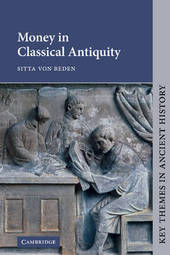
|
Money in Classical Antiquity
Hardback
Main Details
| Title |
Money in Classical Antiquity
|
| Authors and Contributors |
By (author) Sitta von Reden
|
| Series | Key Themes in Ancient History |
|---|
| Physical Properties |
| Format:Hardback | | Pages:260 | | Dimensions(mm): Height 235,Width 157 |
|
| Category/Genre | Economic history |
|---|
| ISBN/Barcode |
9780521453370
|
| Classifications | Dewey:332.493 |
|---|
| Audience | | Tertiary Education (US: College) | | Professional & Vocational | |
|---|
| Illustrations |
8 Tables, black and white; 5 Maps; 5 Halftones, black and white; 5 Line drawings, black and white
|
|
Publishing Details |
| Publisher |
Cambridge University Press
|
| Imprint |
Cambridge University Press
|
| Publication Date |
18 November 2010 |
| Publication Country |
United Kingdom
|
Description
This book was the first to undertake a comprehensive analysis of the impact of money on the economy, society and culture of the Greek and Roman worlds. It uses new approaches in economic history to explore how money affected the economy in antiquity and demonstrates that the crucial factors in its increasing influence were state-formation, expanding political networks, metal supply and above all an increasing sophistication of credit and contractual law. Covering a wide range of monetary contexts within the Mediterranean over almost a thousand years (c.600 BC-AD 300), it demonstrates that money played different roles in different social and political circumstances. The book will prove an invaluable introduction to upper-level students of ancient money, while also offering perspectives for future research to the specialist.
Author Biography
Sitta von Reden is Lecturer in Ancient History at Universitat Munchen. She is the author of Exchange in Ancient Greece (1995) and co-editor, with Paul Cartledge and Paul Millett, of Kosmos: Essays in Order, Conflict and Community in Classical Athens (1998). Her most recent book is Money in Ptolemaic Egypt (2007).
Reviews'Sitta von Reden offers an admirable introduction to some of the main themes in current debates on the use of money in the Classical world. As such, [this volume] will serve as an instructive and clearly presented book to be used in courses dealing with ancient economic matters. The book chimes well with the recent trend among ancient economic historians to seek inspiration from the so-called new institutional economics. Indeed, it seems a both careful and nuanced contribution to this body of scholarship.' Peter Fibiger Bang, The Journal of Roman Studies
|